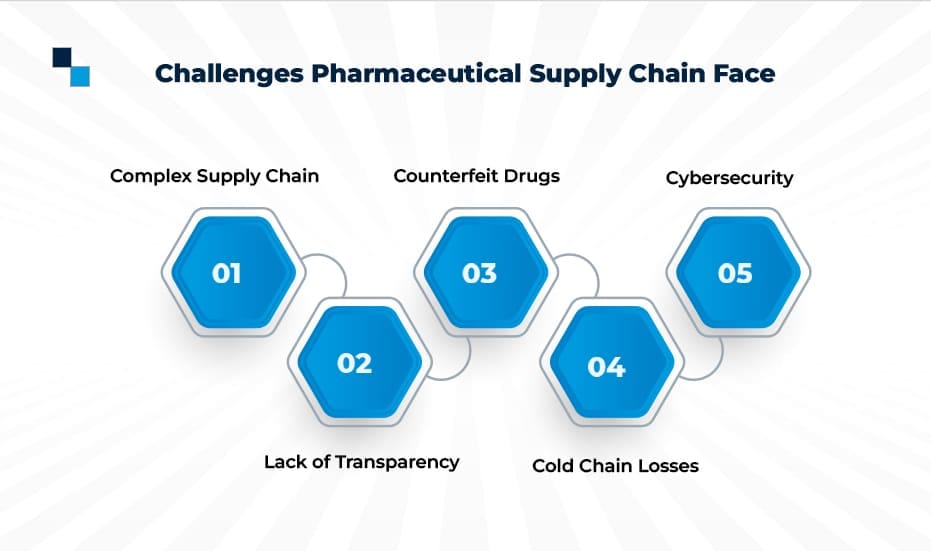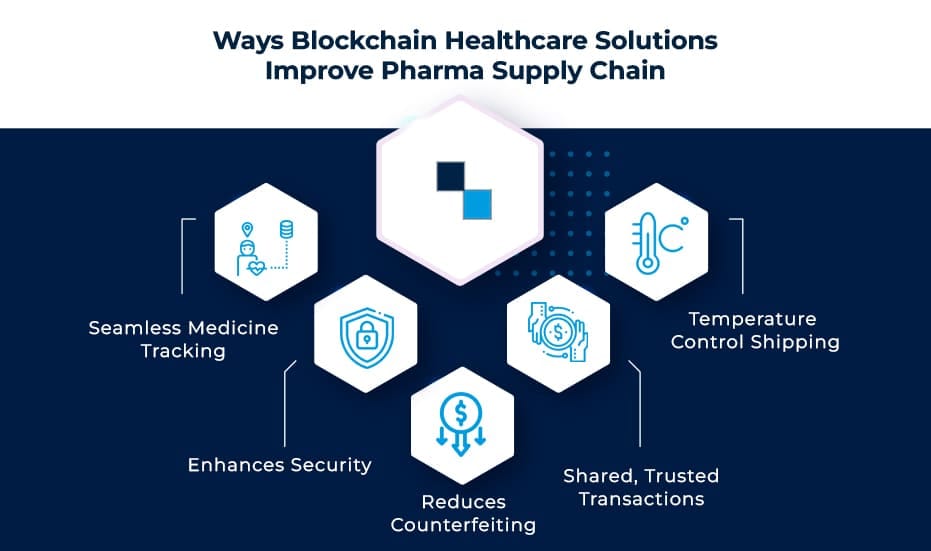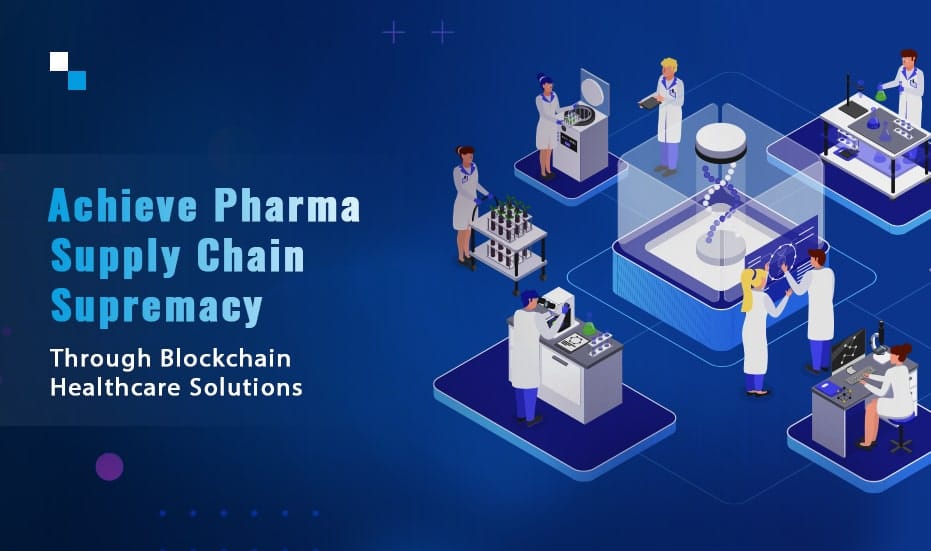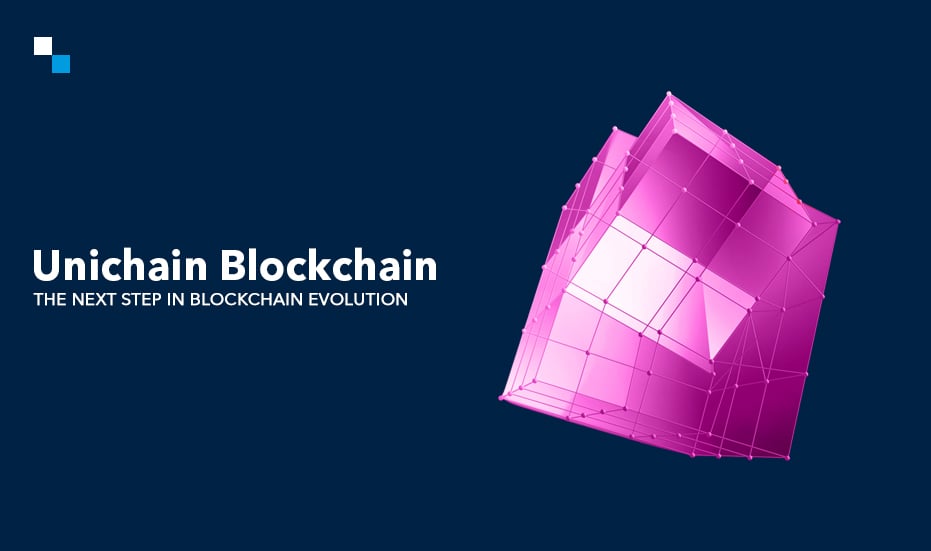
An In-Depth Guide on Arbitrum DeFi Ecosystem
July 6, 2023
Top Blockchain Applications in Real Estate: From Auto Payments to Improved Liquidity
July 6, 2023In the realm of healthcare, where precision and trust are paramount, the Blockchain revolution is unveiling new ways to reshape the industry landscape, particularly in the pharmaceutical supply chain. The technology is giving an edge to the supply chain, infusing it with transparency, efficiency, and security. It weaves a digital tapestry, connecting manufacturers, distributors, pharmacies, and patients with a strong thread of trust.
Blockchain leaves an indelible market across the pharma supply chain, resolving several challenges, such as counterfeiting, inefficient tracking system, lack of transparency, data security, and more, shedding light on why the industry needs this solution.
In this blog, we will explore in-depth the Blockchain use cases in healthcare, specifically focusing on its role in revolutionizing the pharmaceutical supply chain. We will cover the existing challenges the pharmaceutical supply chain faces and how Blockchain can help empower the industry by providing several benefits.
Challenges Pharmaceutical Supply Chain Face
Some of the major challenges the existing pharma supply face and need to address are-

- Complex Supply Chain
The pharmaceutical industry is one of the most complex sectors in the global economy, delivering life-saving drugs and vaccines to people around the world every day. The pharma supply chain involves various stages and multiple parties, ranging from manufacturers to product packages and logistic partners to finally pharmacy from where consumers buy the product. The existing supply chain system is not interoperable and unified. There is no system to verify whether the drug stakeholders received from the manufacturer is original or not. Such a supply chain process provides little control and nearly has no transparency. Besides it, the complex supply chain also lacks better coordination among the players, leading to delays in drug manufacturing and supply as manufacturers don’t get the information about the demand on time.
- Lack of Transparency
As we discussed in the above point, the pharma supply chain is complex and opaque which restricts the stakeholders to track the product’s journey, from its point of origin to destination. The lack of transparency can affect the quality of the medicine and further the patients’ health. This problem needs to be tackled by acting quickly and working together for an effective system, such as Blockchain healthcare solutions, to ensure a defined level of product quality and integrity.
- . Counterfeit Drugs
Another major challenge in the pharmaceutical industry is counterfeit drugs. Fake or substandard medicines can harm patients, and result in huge financial losses. According to the WHO report, an estimated one in ten medical products in developing countries are falsified or don’t meet the standard. Experts at WHO also highlighted the fact that falsified medicines not only have a tragic impact on patients but also a threat to antimicrobial resistance. In simple words, medicines will lose the power to treat.
- Cold Chain Losses
Several pharmaceutical products require strict temperature control during transportation and storage in order to maintain the efficacy and quality of the product. However, equipment failure, human error, or environmental factors result in cold chain losses that damage the products and later have to be discarded before entering the market. According to IQVIA Institute for Human Data Science, the biopharma industry loses approx $35 billion annually due to supply chain temperature control failures.
- Cybersecurity
Pharmaceutical companies and healthcare service providers have a fragmented supply chain that involves several research arms, facilities, and distribution partners across the globe which also makes it vulnerable to cyberattacks. Security attacks can harm sensitive data, disrupt operations, and can decline product integrity. In 2017, a cyberattack was reported by Merck in June 2017 that affected the revenue in the fourth quarter of 2017 by $125 million and for 2017 & 2018 by $260 million and $150 million, respectively.
Ways Blockchain Healthcare Solutions Improve Pharma Supply Chain
Blockchain is a distributed ledger technology that enables the secure and transparent recording and sharing of transactions among multiple parties in a business network without intermediaries.

Blockchain in pharma supply chain resolves numerous challenges in the following ways-
- Seamless Medicine Tracking
Blockchain applications in healthcare and pharma facilitate peer-to-peer networking that helps drug manufacturers, suppliers, distributors, and pharmacists to communicate with each other and track the drug movement throughout the process. It enables smart labels that store and update information about the drug, including its origin, batch number, expiry date, and temperature. It leads to a seamless flow of goods, adding to the efficiency and quality of the supply chain.
- Enhances Security
Blockchain enhances the security of the data in the pharma supply chain by encrypting and hashing every transaction. It protects the data from unauthorized access or modification by using digital signatures and cryptographic keys. This encryption technique prevents data breaches and cyberattacks that affect the confidentiality and integrity of data.
- Reduces Counterfeiting
Falsified or substandard drugs have serious side effects on human health. Blockchain technology in pharmaceutical industry can prevent drug counterfeiting problems by enabling clear visualization of a product’s journey (from manufacturer to end user) with the digitized transactions. Examining vulnerable points throughout the supply chain journey also become easier and reduce the chances of fake drugs entering the market.
- Shared, Trusted Transactions
Blockchain applications in healthcare and pharma also allow supply chain participants in the industry to share the data and transactions in a real time and transparent way. The technology creates a single source of truth that is accessible and verifiable by authorized parties. It enhances trust among participants and reduces the conflicts that may arise due to information asymmetry and mistrust. Blockchain in pharmaceutical supply chain enables parties to access the drug information when the need arises to ensure the quality of the drug being dispensed.
- Temperature Control Shipping
Some manufacturers are working on minimizing the losses caused due to environmental impact on vaccines or medicines. Vaccine cold chain monitoring, at present, powered with Blockchain can trace temperature data and ensure the storage conditions are not compromised. These Blockchain healthcare solutions notify the operators about the inefficiencies in temperature control, so that they can take action on time and safeguard the vaccine supply.

Conclusion
Blockchain is a promising technology that has the potential to overcome several challenges in the pharma supply chain. Whether it is enhancing traceability or preventing counterfeit drugs and medical devices from entering the market, Blockchain can increase the efficiency of the supply chain.
If you also want to transform your pharmaceutical supply chain with Blockchain, connect with a leading Blockchain development company, Antier. We are a reputed organization, serving clients with robust Blockchain Healthcare Solutions that streamline the supply chain processes of the pharmaceutical industry and resolve numerous challenges associated with it. With our expertise in Blockchain use cases in healthcare and pharma, we have earned a place as an important market player that explores better ways to utilize the technology for advantages.



